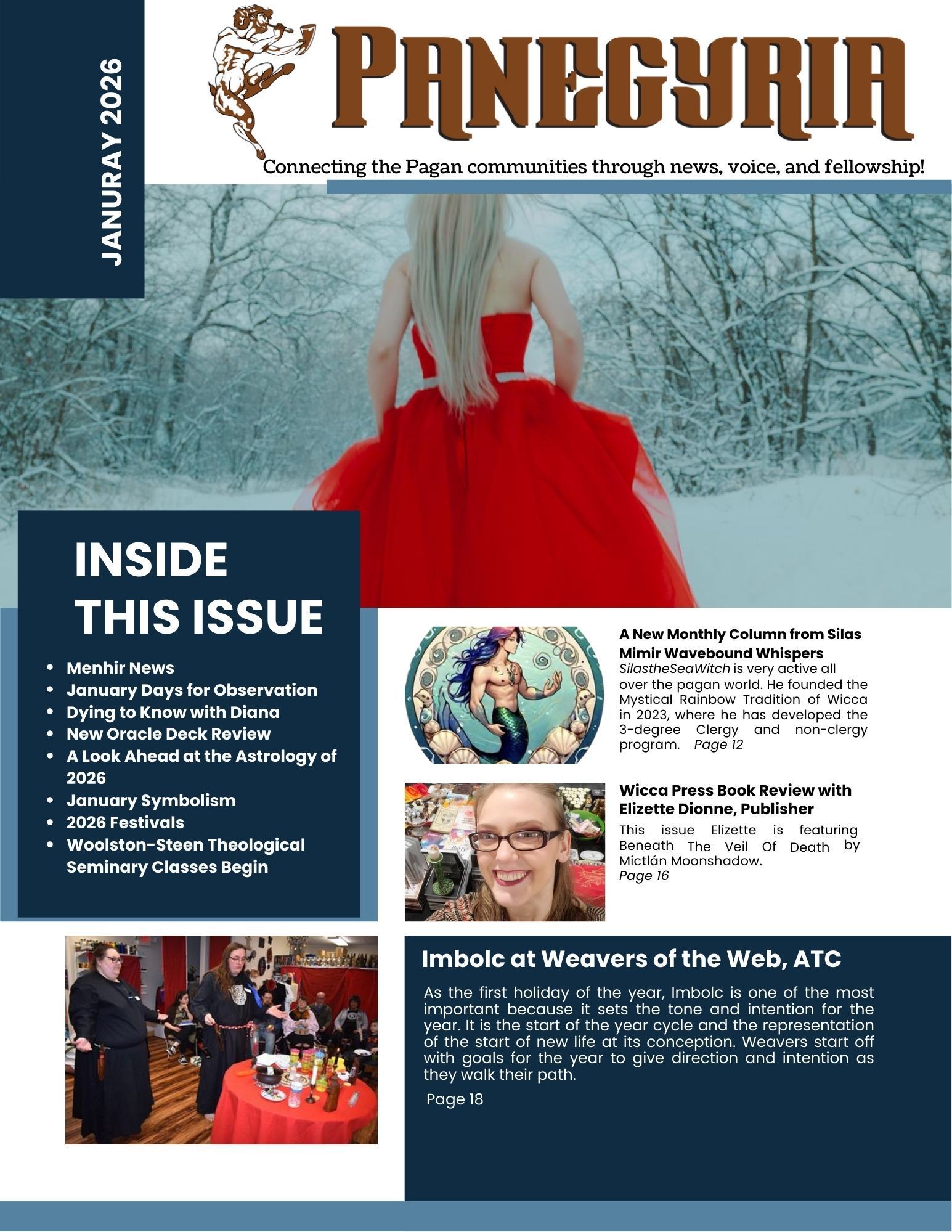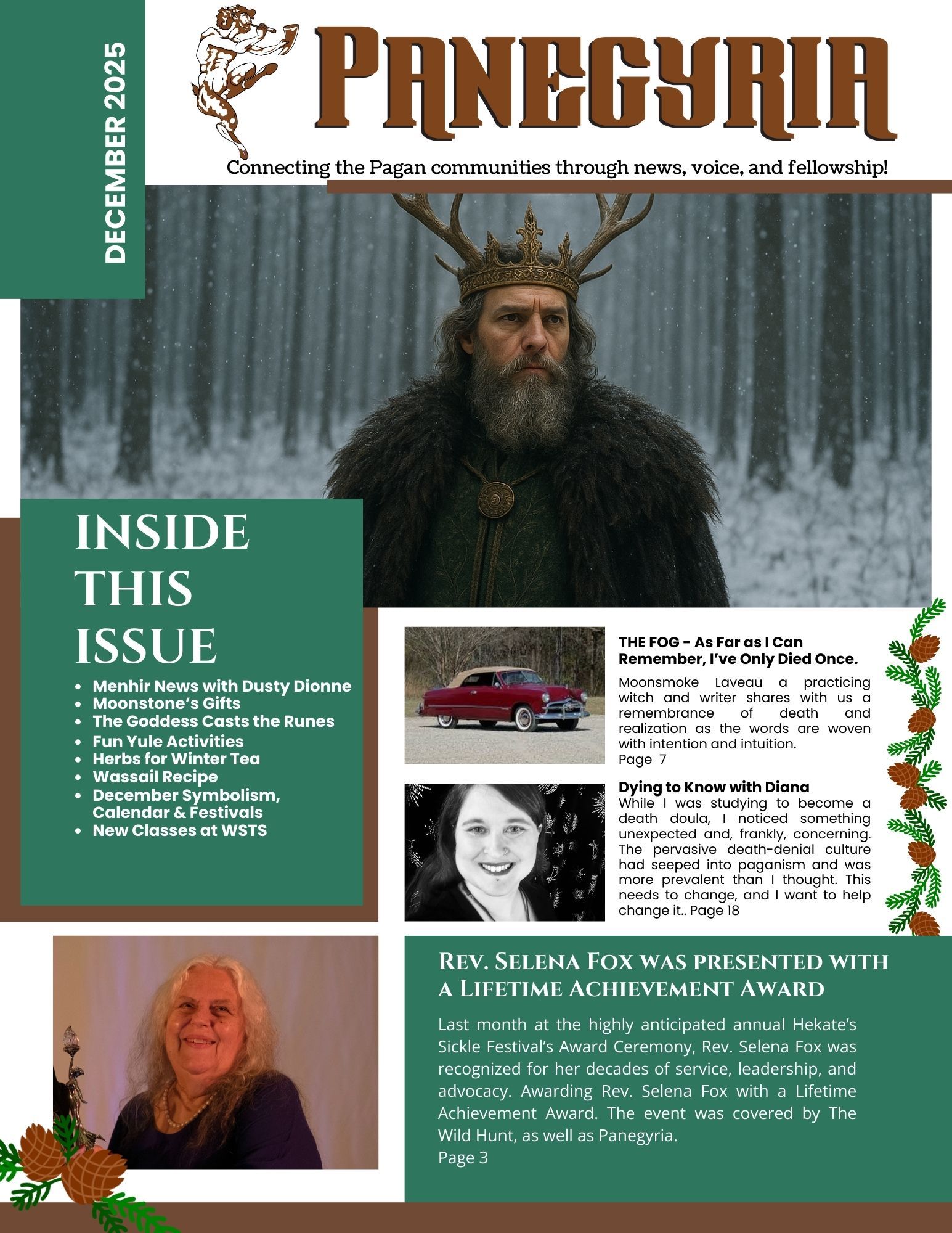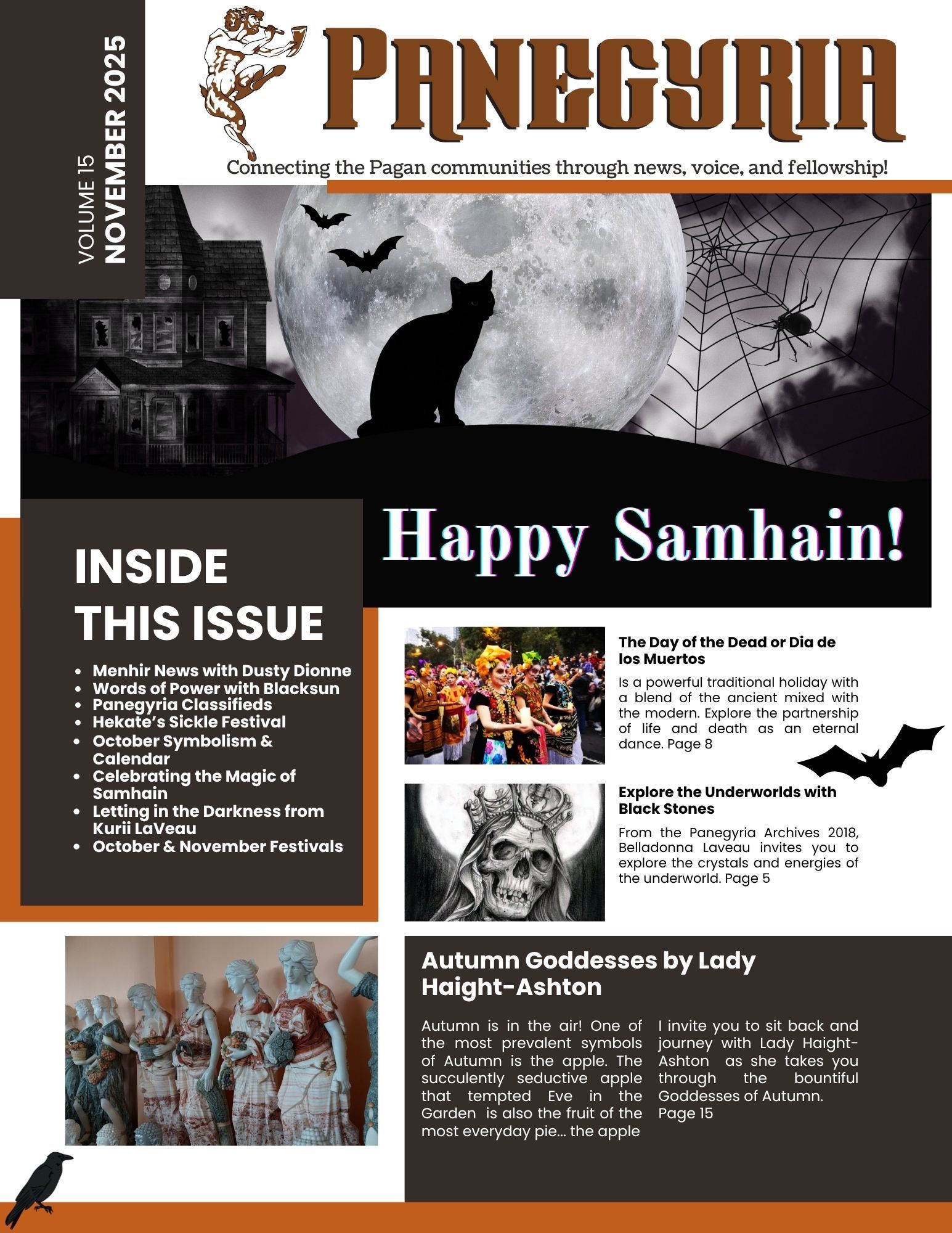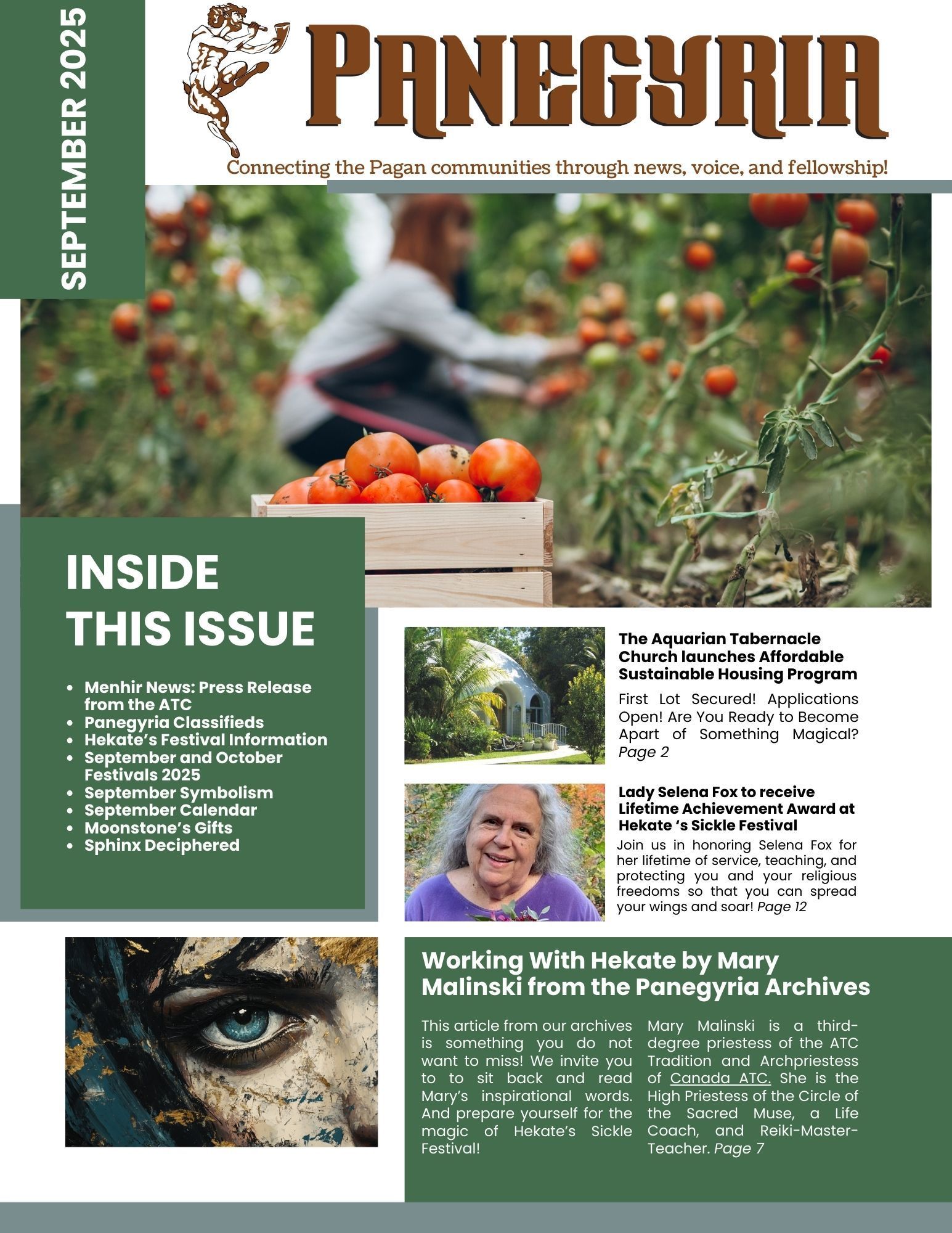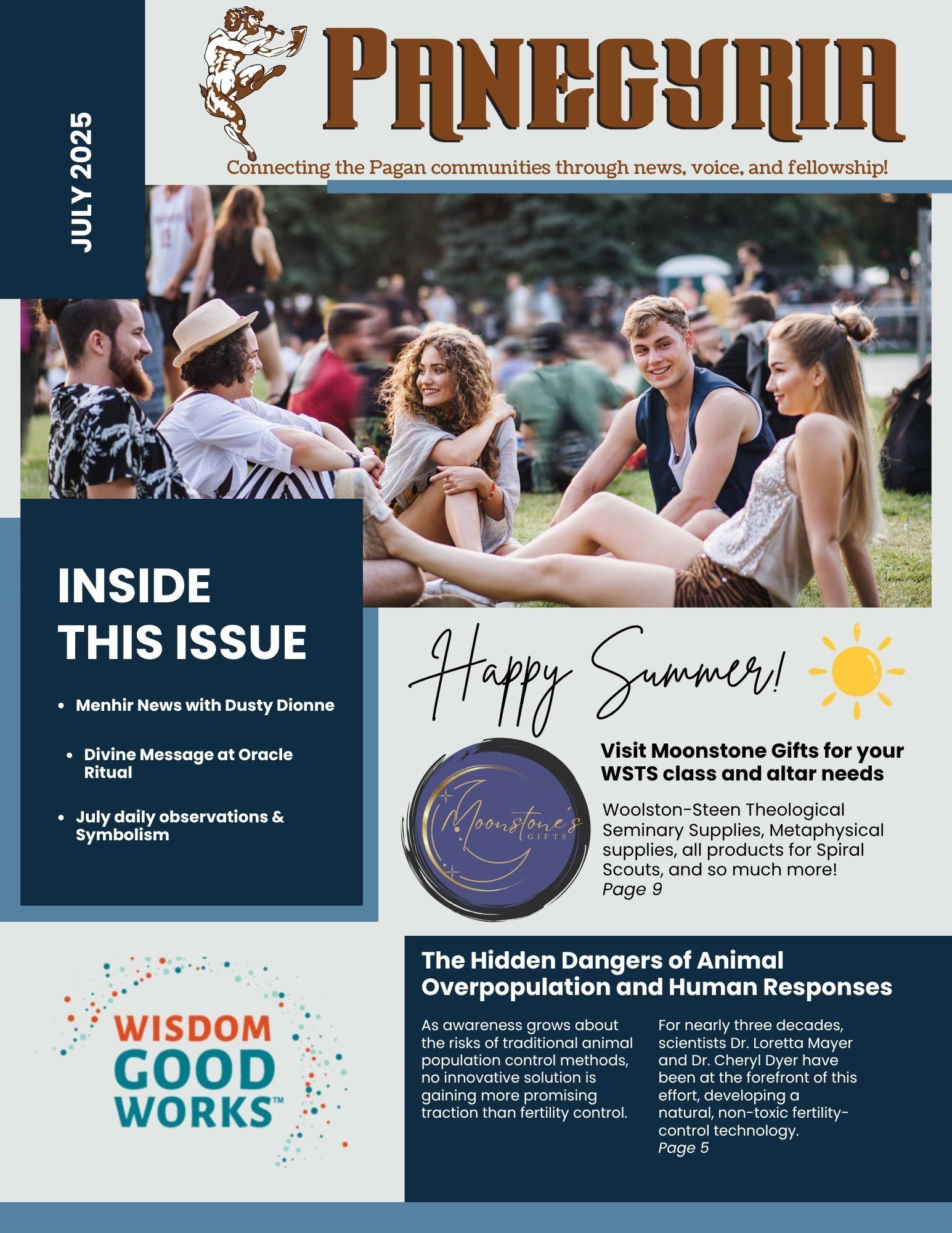Wiccan Worship

For purposes of this discussion, the following definitions apply:
- Spirit is the essence, the definition, the source of existence. Everything has spirit.
- The convention for this work will be that if the word, ‘spirit’ is capitalized, it refers to Deity. If not, then it refers to an individual object.
- Groups of things have spirit. The collective spirit of everything is Deity, sometimes referred to as the 'Great Spirit.'
- Deity is the sole source of spirit.
- 'GOOD' is any event that moves a person closer to Spirit. 'BAD' moves us away from Spirit.
- Beauty is our personal interpretation of the goodness of an object or thing. It could be said that beauty is the radiation given off by the spirit of an object. Spirit is what makes an object manifest, makes it exist.
- In other words, if something exists, it does so because it is part of Deity. Everything is part of Deity. We recognize something as beautiful when we can sense its spirit, its connection to Deity.
- A sacrament is a symbolic religious ceremony.
- Religion is the institutionalized establishment of spiritual ideals, traditions, and practices.
- Spirituality is a personal metaphysical belief system.
- A priest or priestess is any person involved in their own spiritual evolution. In Wicca, each person is considered to be in charge of their own spiritual development.
- Spiritual grace (usually, in discussions about Spirit, shortened to ‘grace’) is the reception of divine beneficence or favor.
One of the most basic elements of all religions is worship. How and what we worship is dependent on what religion we identify with, who is leading the worship service, and our own, private system of beliefs. In Wiccan circles, that can be a highly variable experience. And for those who practice solitary rites, worship might even be a foreign concept. Planning a meaningful worship experience for Pagans is definitely a subsection of the chapter on cat herding. There are thousands of books on lore, ritual magic, ceremonial magic, spell craft, spirituality, tool making, astrology, herbology, ritual making, and hundreds of other subjects of interest to the modern witch. However, very little has been written about our religious worship. And nearly all of what is available on the subject are scrips for worship ceremonies that can be used for groups.
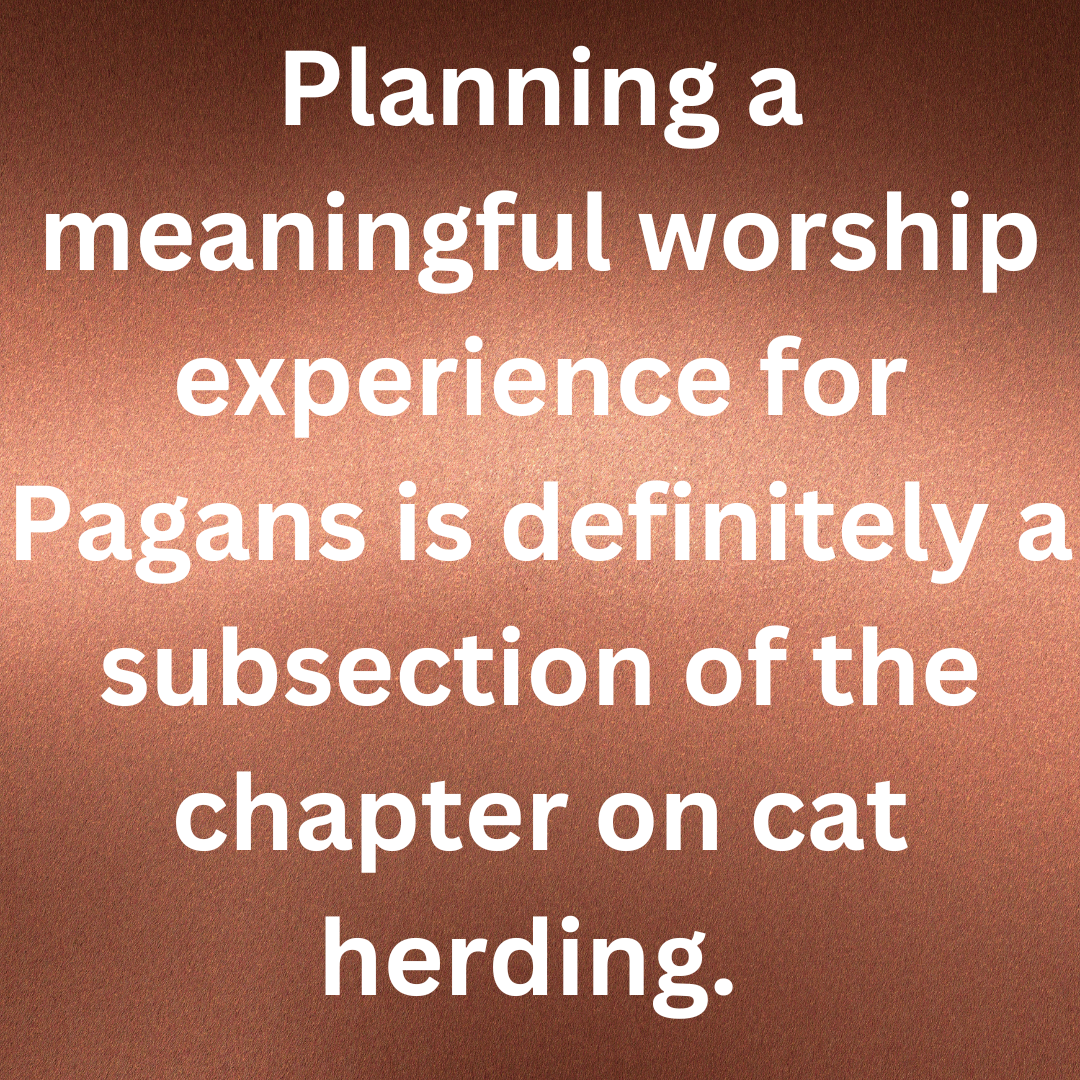
But we are priests and priestesses; we are in charge of our personal spiritual beliefs and practices. We need to know what worship is and how to design worship practices for ourselves and for others.
Most Wiccans are natural-born rebels. What one of us believes and practices probably doesn’t much resemble how the next person in line will believe and act. It’s hard to state what a Wiccan believes as part of their religion because we refuse to be told how to think on such matters. Designing a worship service that is moving and worthy of the time and effort is difficult. And designing one for yourself is sometimes even harder.
A big problem in the Craft is that very few of the thousands of initiates who conduct rituals for others know much about what they are doing. It’s only been within the last twenty years that there have been any teaching institutions worthy of the time and money necessary to present a credible program for initiates. But even with them, some things are not fully understood while others are even ignored.

Here in America, most of us who count ourselves as part of the modern Pagan movement have a history of being raised in one of the Abrahamic religions: Christianity, Orthodoxy, Judaism, or Islam. Each of these has its own customs and traditions of worship that have been developed over centuries of cultural and social evolution. However, they have a common style of worship that many Pagans find irritating. Quite frankly, I would call that style: master and slave. Deity (through the interpretation of their priesthood) is master, the worshipers are the slaves, and their forms of worship are designed to maintain that relationship. Followers of those religions would probably find that description offensive but I believe it to be just as true as it is blunt. Those groups fall into a category known as revealed religions. That is, they have texts and liturgy they claim come from their deity. Their form of worship must conform to the idea that their god dictates and the worshipers comply. One of the most basic tenants of revealed religions is that the ‘word of god’ (as interpreted by their priests, of course) can’t be questioned and their form of worship complements that relationship.
Wicca, like most Pagan religions, is what’s known as a mystery religion. That is not because some of our ceremonies are kept secret or that we don’t hand out our knowledge to just anybody. No, the ‘mystery’ in mystery religions is what will happen to each individual because of those rituals and that knowledge. The mystery is what each person will experience and choose to do with their spirituality after they leave the initiatory circle. Mystery religions typically worship multiple god forms because every deity represents different things to different people.
In most Wiccan traditions, it is customary during a person’s initiation to be ‘introduced’ to the four Elements as “a newly made Witch and Priest(ess).” For some, this might be confusing since these terms are rarely well-defined before or during the initiatory ritual. That is by design. Both words will gain meaning only from the initiate’s own life activities. What happens during the initiation is not The Mystery in our mystery religion. It is what we do when we walk the Wiccan pathways after initiation that gives meaning to those words for each of us.
Wicca is a blend of magic and spirituality. Every Wiccan is both a witch and a person trying to understand Spirit (the priesthood). We learn about magic by learning spells and about Nature. We learn about Spirit by participating in our rituals. Nothing in any of the initiations I have attended in the last 45 years demands that I perform magic or conduct rituals for anyone except myself. Nobody said I had to make magic for others or be a minister to anybody. And yet, more often than not, that is exactly what many of us begin to do soon after our first initiation. For those lucky enough to be part of a well-made training program, instruction and monitored practical experience in both of these areas can be invaluable. But there’s always more to learn.
Worship is generally defined as having or showing veneration, admiration, or deep respect for a deity, person, or other target. But, just as the definition of a car doesn’t teach us how to drive, our definition of worship doesn’t tell us how it's done. To learn that, we first need to look at why we worship. Since this discussion is directed toward Wiccans, we will limit our investigation to Pagan spiritual worship. However, be aware that nearly everything said of spiritual worship can apply to all forms of worship.
Generally speaking, the reason we worship is to create, enhance, and/or refine our bond with the target of our worship. In Wicca, we view divinity as a multiplex. That is, we see it expressed in many forms, as there being many gods and goddesses. For us, everything in Nature is an expression of the Divine. Our rituals and other forms of worship are designed to make us more mindful of this universal divinity so we might live in greater harmony with it.

Worship is primarily a mental and emotional activity but it can have a physical element as well. The worshiper’s own body is the most common physical component. Symbolic jewelry, body art, and special clothing (or, in the case of some circles, the lack of clothing) can figure into our worship practices. Chanting, music, poetry, and sermons are also included. Why is worship so complex and what do these various elements do that qualifies them as parts of worship?
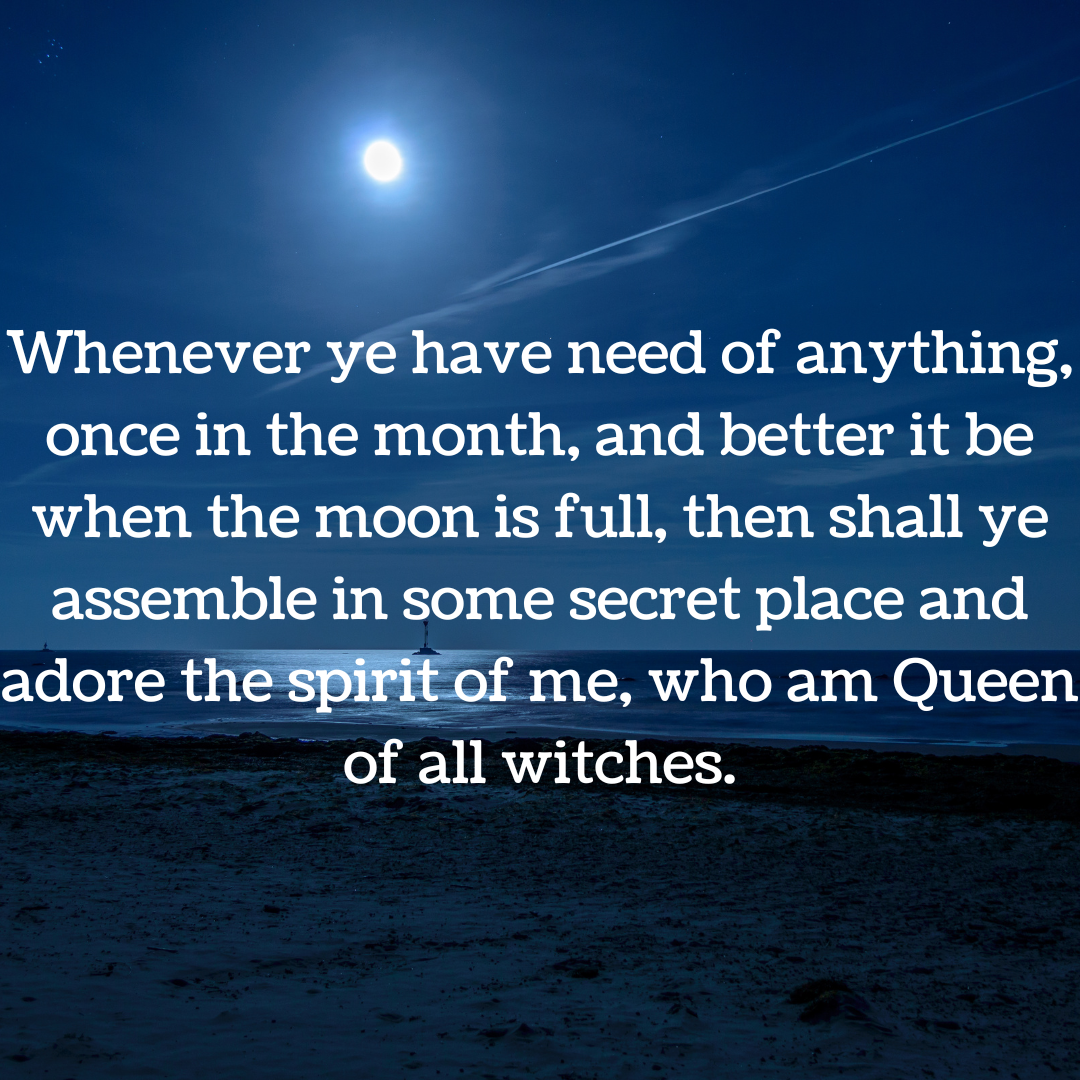
Worship is any practice that establishes, promotes, increases, and/or enhances our desire for spiritual grace. In The Charge of the Goddess by Doreen Valiente (1922 – 1999), a piece of liturgy used by many Wiccan circles, (there are at least three different versions written by Valiente) there is a declaration by the Goddess that all acts of love and pleasure are her rituals/sacraments. While this hints at the rewards of divine benevolence, it is often interpreted to refer almost exclusively to sexual pleasure. But, as liberating and joyful as that may be, it is not the only pleasure in life. The Charge clearly says all acts of love and pleasure. And if what you are doing is pleasurable, you are far more likely to repeat that activity. Just as all acts of love and pleasure are sacraments (acts of spiritual worship), it is also true that all acts of worship can be pleasurable. We derive pleasure from things that increase our spirit. Spirit is derived from only one source, divinity (the so-called Great Spirit). We recognize spirit as beauty (see my book, Be ALL! for further analysis). As in all things magical, beauty is in the observer, not the thing observed. And so it could be said that all worship is an inward journey to reach, guide, and teach our own spirit. Worship is more than simply having fun. Whether you create worship experiences for yourself or others (or both), it will be an intentional act, a magical act. Creating a worship service is spell work.
So, let's get to work and build a spell:
The first thing we do when creating a spell is to define and refine our vision of what we want the spell to accomplish. We can call that the function of the spell. And, in designing anything, form always follows function.
What do I want our worship spell to do, what do I want the result to be? Generally speaking, I want it to make me more harmonious with the way the universe works. I want to ‘go with the flow’ better so that my life will be more enjoyable, easier, more meaningful, and less stressful. My vision includes having fun but also being more mindful of my connection to Spirit. In my mind, those two goals are actually one thing.
As mentioned, worship is an internal journey. Whatever we are doing, there are beliefs, memories, and complex intentions involved in our worship practices. These elements must be in harmony with the worship service’s design and application. Designing a worship experience will rely heavily on our understanding of human nature. After all, what we are trying to do is predict how people will feel and react to whatever is presented in the worship service.

Let’s imagine we’re going to create a worship service for what we expect will be a group of a hundred people or more. Let’s further assume that we want to worship Demeter. We read up on the various attributes of the goddess as well as some of the stories and lore surrounding her. A quick read on the internet informs us that Demeter is referred to as a mother goddess, and goddess of the grain. She has dominion over all of earth’s agriculture. She is the daughter of Titans and so considered one of the Olympian gods. In Roman theology, she is conflated with Ceres, their goddess of the grain. She was the sister of Zeus and Hades and there is a great deal of lore about her that includes her interaction with those two gods. She, and her daughter, Persephone, plus Hades and Zeus, figure prominently in the Eleusinian Mysteries, an annual celebration held for two millennia in Greece that had its roots in pre-Hellenic, Mycenaean cults.
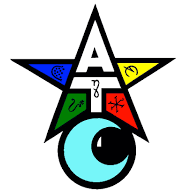
So the question is, what can we do in our worship service that will bring us closer to the various spiritual aspects of this goddess? How can we increase our desire for a closer relationship? What can we do that will make us more aware of and encourage us to become in greater harmony with her?
For many years, the Aquarian Tabernacle Church has produced a four day festival known as Spring Mysteries that presents its interpretation of the Eleusinian Mysteries. The original rituals have been lost to time but there are remnants and hints of the old rites that the church has pieced together to form a reasonable likeness of the rituals that survived for over two thousand years in Greece.
Although the whole celebration of The Eleusinian Mysteries is called an initiatory rite, it has many parts designed to be worship ceremonies. Typically, the church would establish individual altars for the gods and goddesses depicted in the many sections of the rites. Demeter would have her own altar space among the others, of course. During the narrated drama (a common form of Greek drama) presented at Spring Mysteries, the participants typically engage in prayers and displays of reverence for Demeter. Also, the story that is told during these rites helps create a sympathetic bond with the goddess and a desire to gain her favor. And so, the experience of Spring Mysteries becomes not only an initiatory one but a worship service as well.
Creating a worship experience isn’t that complicated. Basically, there are six steps:
- Determine why the worship experience is needed and who or what is being targeted.
- Know the result you are looking for. This must be done before you begin anything else. (Basic Magic 101)
- Think of the feelings the result will produce for you (and/or others).
- What activity can produce those feelings that will be mentally and emotionally connected to the target of the worship?
- Make that activity happen and be sure to make it understood that it is associated with the target of worship.
- Make a clear and definite end to the worship activity. Do not ignore this step!

If you are creating a worship service for just yourself, simply reminding yourself who or what you are worshipping will probably be sufficient to satisfy step #5. However, in a group activity, such comments might seem awkward and distracting. More often than not, a visual reminder, such as a picture, artwork, sculpture, symbolism, and iconography of all sorts will serve to establish the mental and emotional connections for each worshipper.
A quick note about clear communication: I refer to the emotional association mentioned in those five steps. One of the most important things I ever learned is: How it feels is what it means. Every word, action, or thought has no meaning unless and until it has an associated feeling. How we feel about something defines what it means. If we change the feeling, we change the meaning.

We don’t live in a world of dictionary definitions. Our feelings dictate the meaning of everything. What and how we worship will affect how we define our world. This is why many spiritual ceremonies are filled with grandiose or exaggerated emotive sections. Changing the meaning of some part of your reality will change your life. How you feel about a subject dictates its meaning, period. I’ve written about how to make meaningful and moving rituals in my book, Crafting Pagan Rituals. When I wrote that, I should have expanded on this formula of feeling = meaning = perspective = reality. Perhaps next time. Also, take note of steps three and four. In particular, take note that it asks you to think of the feelings you will have when the result you wish for manifests. This complies with the Magic 101 maxim: “Don’t think about how; think about what.”
Visualizing the result you want is the subject of countless magical lessons. But, unless you can conjure how that result will feel, your visualization will be incomplete and the results of your magic will be less than you desire. This is why it is so important for the magician to believe their magic will work. This doesn’t mean just saying you believe; you must be so sure of what you believe that doubt is completely absent from your thoughts. As any magician will tell you, this isn’t nearly as easy as it might sound. To suspend any and all disbelief, one must train the mind just as one would train the body to run a marathon. First, learn to walk, then to run. In magic, one learns the finer points of visualization through practice. Practice, practice, practice. Learn to clear your space of all negative thoughts and feelings. Sweep away any and all distractions and call upon your living powers of manifestation. Create! Create a world in which you have already manifested your desire.
Did I say ‘desire?’ That’s what worship is all about: creating a desire. In Wicca, as in any other religion, the desire is to become in greater harmony with Deity. How this is accomplished is not nearly as important as the fact that it is manifest! Children are wonderful about this. ‘Pretend,’ to a child is as easy and complete as the greatest magician’s work. Think back to your own childhood and remember the grand adventures you experienced, the wondrous places you went, the magnificent thrills and strange wonders of the worlds you visited, and the worlds you created.
Children are natural-born magicians. The power of a child’s mind is enormous. It takes years of discouragement and distraction to smother that power (“Oh, Johnny, you’re just imagining that”). And it might take years to regain those powers but it is worth every second of self-discipline and training. Believe. Believe in yourself and the world you will manifest. Worship the beauty all around you; it is how you experience the gods. Create a world filled with love and beauty and know it will be so long as you can visualize it. Worship regularly, every day. Indeed, make your whole life a worship experience. Live in harmony with the beauty and wonder of the world you create.

